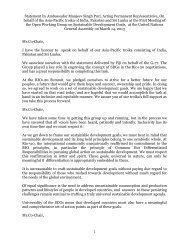STATE OF THE WORLD'S CITIES 2012/2013 Prosperity
STATE OF THE WORLD'S CITIES 2012/2013 Prosperity
STATE OF THE WORLD'S CITIES 2012/2013 Prosperity
Create successful ePaper yourself
Turn your PDF publications into a flip-book with our unique Google optimized e-Paper software.
Working on the five ‘spokes’: Interdependencies and<br />
interactions among the five ‘spokes’ in the ‘wheel of urban<br />
prosperity’ (productivity, infrastructure, quality of life,<br />
equity and environmental sustainability) can be deliberately<br />
enhanced (as opposed to being allowed to occur all by<br />
themselves) through the strategies and interventions that<br />
are part and parcel of urban planning. More specifically, it<br />
is in the power of a well-planned decision or well-calibrated<br />
choice in one dimension of prosperity − for example, the<br />
design of a street supporting multimodal transport as part<br />
of the infrastructure development of the city − not just to<br />
make that particular part of the urban space more accessible<br />
or pedestrian-friendly, but in the process also to improve<br />
productivity (shops, street-trading, etc.), quality of life and<br />
social inclusion (see Box 3.2.1.).<br />
Financial support: For urban planning to work more<br />
efficiently as an urban power function, it must be reinforced<br />
from a financial and legal point of view. Cities need more<br />
permanent funding mechanisms to support the provision<br />
of public goods and the design and implementation of<br />
sustainable technical solutions if their performance and<br />
functionality are to be improved.<br />
Few cities or countries are in a proper legal position to<br />
do that, and where they are, they find themselves faced with<br />
systematic interference by special interest groups or political<br />
expediency. 40 Here again, the public interest must prevail,<br />
and governments must look to improve and enforce the<br />
mechanisms that enable local authorities to capture urban<br />
land and site values, in the process generating the revenues<br />
needed to extend prosperity to the poorest areas. 41<br />
ExPANDING PROSPERITy:<br />
CHANGING CITy LANDSCAPES<br />
In many cities, urban planning has been instrumentalised by<br />
the real estate business. Cities that respond to the interests<br />
of the better-off or only focus on strategic economic<br />
interventions in specific spaces tend to create enclaves of<br />
prosperity for a select few.<br />
POLICy UN-Habitat<br />
calls for<br />
a fresh, different type<br />
of urban planning and<br />
design – one that has<br />
the power to transform<br />
city landscapes and<br />
expand existing<br />
enclaves of prosperity<br />
to the entire city.<br />
Urban planning can be<br />
so unrealistic or overambitious<br />
as to overlook<br />
the need to steer and<br />
control spatial expansion,<br />
with large parts of the city<br />
ignoring existing plans or<br />
regulations. “The city falls<br />
out of the map, making<br />
it irrelevant”, deplores<br />
Innovating to Support the Transition to the City of the 21st Century<br />
111<br />
POLICy<br />
Restoring urban planning at the central point of the<br />
‘wheel’, where a solid and efficient institutional ‘hub’<br />
holds together, controls and activates the five ‘spokes’ , can only<br />
enhance the conditions for sustained, shared prosperity.<br />
POLICy<br />
an expert in Panama<br />
City. 42 Land legislation<br />
Either by action or<br />
and planning<br />
omission, this type of urban must combine to put<br />
planning contributes to<br />
municipal authorities<br />
in a better position to<br />
the production of spatial<br />
extract land values and<br />
inequities, rather than<br />
related capital gains, with<br />
better shared prosperity.<br />
the additional revenue<br />
This reinvigorated<br />
available for the funding of<br />
notion of urban planning<br />
infrastructure extensions<br />
comes with a new value<br />
and other projects.<br />
system that relies on<br />
effective institutions, welladapted<br />
laws and regulations, sustainable urban solutions and<br />
active civic involvement in public affairs. This type of planning<br />
signals a paradigm shift towards a new urban pattern − the<br />
city of the 21st century: a city that can better respond to the<br />
challenges of our age, optimizing resources to harness the<br />
potentialities of the future; a people-centred city, one that is<br />
capable of transcending the inefficient, unsustainable GS20C<br />
model, in the process integrating and nurturing the five<br />
dimensions of urban prosperity as defined in this Report.<br />
However, if urban planning is to be reinvigorated, it<br />
must shift away from the ‘spoke’ of productivity, where it has<br />
been predominantly operating these past several decades,<br />
to the centre of the ‘wheel’, right in the ‘hub’: indeed this<br />
is where, as an urban power function, planning will be in a<br />
better position to make its beneficial influence felt across all<br />
the ‘spokes’, increasing the<br />
scope of shared prosperity<br />
across the whole of the<br />
The 21st<br />
city. This will, of course, POLICy century is in a<br />
involve political choices<br />
position to ensure equitable<br />
and commitments, which<br />
development, preserve<br />
must be turned into tools, the natural environment,<br />
regulations and sustainable promote inexpensive energy<br />
sources, provide necessary<br />
technical solutions, which<br />
infrastructures and ensure<br />
will be all the better<br />
inclusive economic growth.<br />
accepted by society at large The city of the 21st century<br />
as they are seen to embed builds the conditions of<br />
shared prosperity across the prosperity for all.<br />
whole urban space.



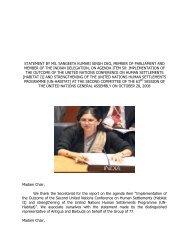
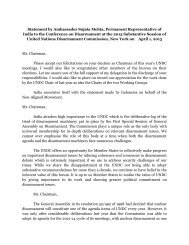
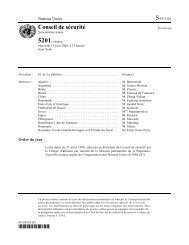
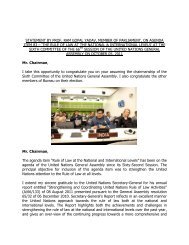
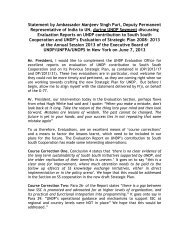
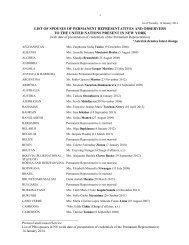
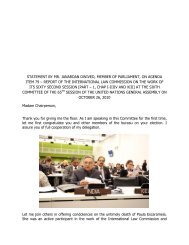
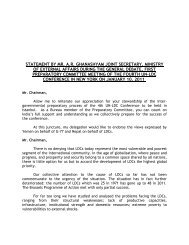
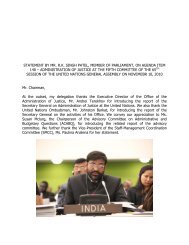
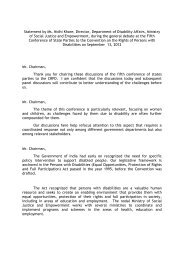
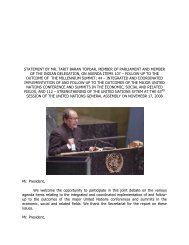
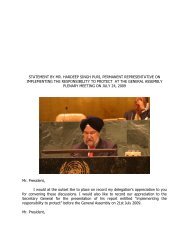
![1 statement by dr.[mrs] kakoli ghosh dastidar - Member States Portal](https://img.yumpu.com/27526598/1/190x245/1-statement-by-drmrs-kakoli-ghosh-dastidar-member-states-portal.jpg?quality=85)
